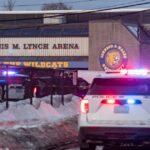
U.S. District Judge Paul L. Friedman granted John Hinckley — the man who in 1981 tried to assassinate then-President Ronald Reagan — an unconditional release on Wednesday.
“He’s been scrutinized. He’s passed every test. He’s no longer a danger to himself or others,” Friedman said during a Wednesday hearing in Washington, The Associated Press reported.
Hinckley, now 67, fired at Reagan with a Röhm RG-14 revolver on March 30, 1981, when the Republican president was returning from an event at the Washington Hilton.
The weapon’s .22 caliber bullet ricocheted off the presidential vehicle and hit Reagan in the underarm, critically injuring him. Also hurt by Hinckley’s gunfire were then-White House Press Secretary James Brady, Secret Service agent Tim McCarthy and D.C. police officer Thomas Delahanty.
Brady suffered brain damage from the gun wound and had a permanent disability until his 2014 death, which medical examiners ruled as a homicide since it resulted from his injuries.
Hinckley had an infatuation with actress Jodie Foster, then 18 years old, that was determined to be a rare delusional syndrome called erotomania, and he thought he could impress her by killing Reagan.
On June 21, 1982, he was found not guilty because of insanity and subsequently interred at the St. Elizabeths Hospital in Washington full-time until 2006.
Even though he was let out of the psychiatric facility in 2006, he was under restrictions on travel and electronic devices and had to attend mandatory therapy sessions.
In 2016, Hinckley moved to Virginia, where he has lived since. He had created a YouTube channel and began working toward a music career.
Do you agree with the decision to release Hinckley?
Yes: 0% (0 Votes)
No: 0% (0 Votes)
Friedman, who was nominated to the U.S. District Court for the District of Columbia by then-President Bill Clinton in 1994, said in September that he would release Hinckley.
“If he hadn’t tried to kill the president, he would have been unconditionally released a long, long, long time ago,” the judge said, according to The Associated Press.
“But everybody is comfortable now after all of the studies, all of the analysis and all of the interviews and all of the experience with Mr. Hinckley,” Friedman said.
However not “everybody” was “comfortable” with the judge letting the criminal off the hook.
In a September opinion piece for The Washington Post, Reagan’s daughter, Patti Davis, condemned Friedman’s decision, saying, “He can now, if he wants, contact me, my siblings and the actress Jodie Foster, whom, as is well known, he was trying to impress by carrying out his ambush.”
“I don’t believe that John Hinckley feels remorse. Narcissists rarely do. I don’t believe that the man who wrote letters to Charles Manson and Ted Bundy while he was in St. Elizabeths Hospital regrets what he did,” Davis wrote.
“When someone you love is gunned down, time doesn’t move on from that day, that hour, that moment. That event is your prison, and there is no release from it.”
Many others disagreed with the decision.
He tried to kill President Ronald Reagan. John Hinckley should NEVER breathe free air again.
— Joe Pags Pagliarulo (@JoeTalkShow) June 1, 2022
NOPE NOPE NOPE!
If you shoot the president, you don’t get to play outside anymore!John Hinckley granted unconditional release — 41 years after shooting Reagan. Judge says Hinckley shows no signs of active mental illness. #johnhinkley #RonaldRegan #POTUS pic.twitter.com/l1xVtyRpOK
— Don Stuck (@donstuck) June 1, 2022
So, you can attempt to assassinate the President of the United States, shooting him in the chest, his press secretary in his head, paralyzing him for life, and you can walk free eventually?
This makes all presidents significantly less safe from current to all future ones.
— CSharpner – Decentralize All The Things! (@csharpner) June 1, 2022
However, Hinckley attorney Barry Levine hailed his release, claiming the case “started with a troubled young man who inflicted great harm” but in the end, “I think we have salvaged a life,” the AP reported.
“John worked hard. He wanted to correct something that he was unable to erase, and this is the best outcome that one could imagine. His regrets will always be with him with respect to the families of those he injured,” Levine said.






